From early next year, Facebook intends to let its two billion-odd users - more than 139 million of whom are in Africa - make digital payments through its apps and popular messaging service WhatsApp using a new crypto-currency called Libra.
It could have profound implications for a continent which receives a huge amount of remittances - and is one of the least-banked regions of the world, something that has allowed for other innovations like mobile cash payments to take hold in Africa.
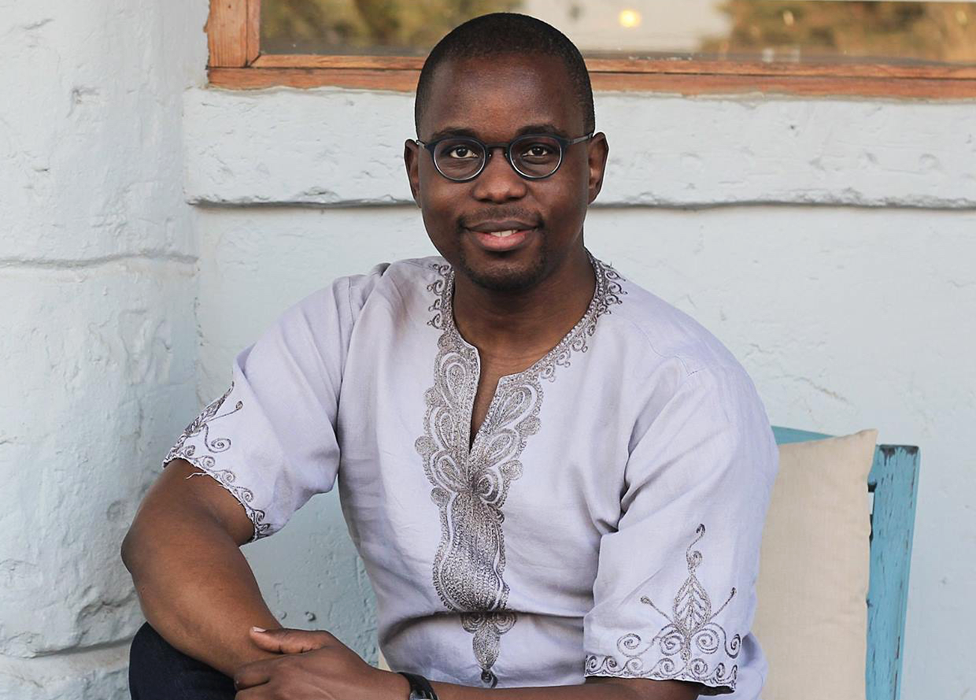 Andile Masuku
Andile Masuku
 As a Zimbabwean living in South Africa, I have become numb to the daylight robbery that ensues whenever I receive money from abroad or send cash to my family back home.
As such, like many other cautious pragmatists, I relish the prospect of a network like Libra permanently disrupting the lucrative cash remittance businesses of large banks and money transfer services like Western Union and MoneyGram.
According to a World Bank report published last year, the cost of sending cash in sub-Saharan Africa was at least 20% higher than any other region in the world. The report revealed that sending $200 to and from the region in the first quarter of 2018 cost a whopping $19.
But we must not be naive to the myriad factors responsible for maintaining market inefficiencies and actively engineering economic complexities which corporations like Western Union exploit to great effect.
As a Zimbabwean living in South Africa, I have become numb to the daylight robbery that ensues whenever I receive money from abroad or send cash to my family back home.
As such, like many other cautious pragmatists, I relish the prospect of a network like Libra permanently disrupting the lucrative cash remittance businesses of large banks and money transfer services like Western Union and MoneyGram.
According to a World Bank report published last year, the cost of sending cash in sub-Saharan Africa was at least 20% higher than any other region in the world. The report revealed that sending $200 to and from the region in the first quarter of 2018 cost a whopping $19.
But we must not be naive to the myriad factors responsible for maintaining market inefficiencies and actively engineering economic complexities which corporations like Western Union exploit to great effect.
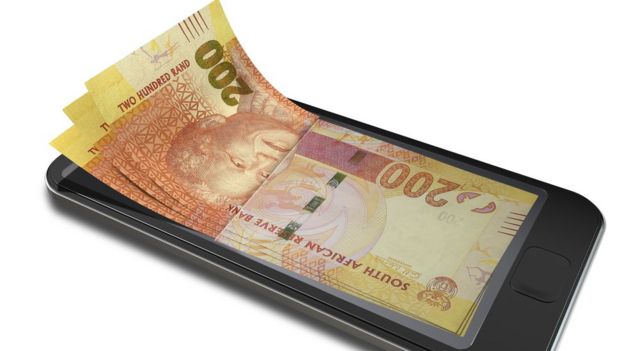 Image copyrightGETTY IMAGES
Image captionThe cost of sending cash in sub-Saharan Africa is 20% higher than any other region in the world
The fact is, many governments in Africa have enabled the remittance industry status quo and have come to rely on lining their coffers with remittance-related revenue.
Image copyrightGETTY IMAGES
Image captionThe cost of sending cash in sub-Saharan Africa is 20% higher than any other region in the world
The fact is, many governments in Africa have enabled the remittance industry status quo and have come to rely on lining their coffers with remittance-related revenue.

 And these are things that African leaders need to address with Facebook up front. In the US, lawmakers have already proposed a moratorium on the Libra rollout until Facebook assures Congress that Libra will not exacerbate money-laundering and the funding of terror groups among other issues.
Facebook's Libra white paper, which outlines the tech giant's plans to re-imagine global finance, does show that unlike completely decentralised digital currencies such as Bitcoin, which operate outside the oversight of central authorities or banks, Libra is set to be backed by a reserve of actual currencies and assets.
Facebook is using this difference to convince policy-makers that Libra is a bankable bet. It has the high-powered backing of the likes of Visa, MasterCard, Uber, Spotify and even South Africa's PayU.
And these are things that African leaders need to address with Facebook up front. In the US, lawmakers have already proposed a moratorium on the Libra rollout until Facebook assures Congress that Libra will not exacerbate money-laundering and the funding of terror groups among other issues.
Facebook's Libra white paper, which outlines the tech giant's plans to re-imagine global finance, does show that unlike completely decentralised digital currencies such as Bitcoin, which operate outside the oversight of central authorities or banks, Libra is set to be backed by a reserve of actual currencies and assets.
Facebook is using this difference to convince policy-makers that Libra is a bankable bet. It has the high-powered backing of the likes of Visa, MasterCard, Uber, Spotify and even South Africa's PayU.
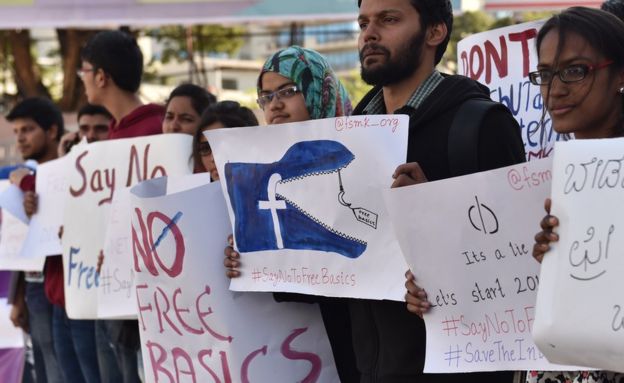 Image copyrightAFP
Image captionIndia opposed Facebook having a monopoly over the internet with Free Basics
Dubbed by detractors as the "Internet According to Facebook", many African countries lapped it up.
India, quite famously, did not, arguing that it undermined the principle of net neutrality - the idea that all internet traffic should be treated equally - and that it was improper to allow Facebook to deliver a dumbed-down version of the internet to hundreds of millions of people.
Image copyrightAFP
Image captionIndia opposed Facebook having a monopoly over the internet with Free Basics
Dubbed by detractors as the "Internet According to Facebook", many African countries lapped it up.
India, quite famously, did not, arguing that it undermined the principle of net neutrality - the idea that all internet traffic should be treated equally - and that it was improper to allow Facebook to deliver a dumbed-down version of the internet to hundreds of millions of people.

 With the help of the pan-African mobile telephone operator Airtel Africa, Facebook rolled out Free Basics in no less than 17 African countries.
It is hard to argue that offering poor, disconnected Africans limited web access to services like health, education, jobs, communication and local content at no cost to them is anything but beneficial.
Yet Facebook's now infamous business model of monetising user data makes it impossible to ignore the potential adverse long-term impact of allowing such a firm to profit from curating the only version of the internet millions of Africans may ever come to know.
Given the company's high-profile shortcomings, there is good reason to distrust Facebook and many die-hard crypto-currency proponents think of the Libra concept as the perfect prop for a hopelessly broken global finance industry.
With the help of the pan-African mobile telephone operator Airtel Africa, Facebook rolled out Free Basics in no less than 17 African countries.
It is hard to argue that offering poor, disconnected Africans limited web access to services like health, education, jobs, communication and local content at no cost to them is anything but beneficial.
Yet Facebook's now infamous business model of monetising user data makes it impossible to ignore the potential adverse long-term impact of allowing such a firm to profit from curating the only version of the internet millions of Africans may ever come to know.
Given the company's high-profile shortcomings, there is good reason to distrust Facebook and many die-hard crypto-currency proponents think of the Libra concept as the perfect prop for a hopelessly broken global finance industry.
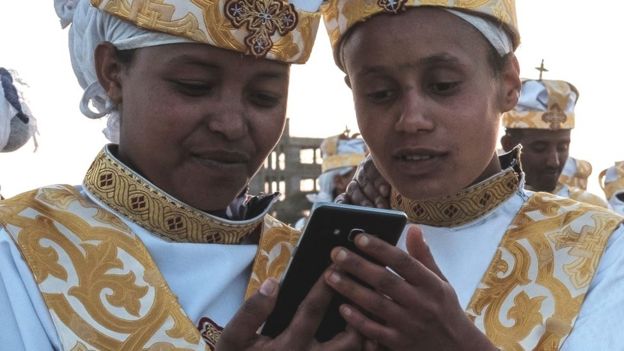 Image copyrightAFP
Image captionThe internet was cut off in Ethiopia recently first because of exams and then after an attempted coup
Critics also point to the ease with which African governments can cut off the internet and messaging apps, meaning if it suited them they could effectively cut off their citizens from accessing digital cash. Would it be wise for us to become too dependent on Libra?
The recent network issues on Facebook, WhatsApp and Instagram experienced in South Africa this past week have also served as a sober reminder of how economically disruptive relying on Facebook's Libra could prove to be should a similar outage occur again.
I am encouraged by how key personalities within Africa's innovative digital money community are leading impressively nuanced debate about the potential pros and pitfalls of Libra.
Social media posts and impassioned blog posts by Nigeria's Seyi Taylor, who thinks if it proves cheap and convenient, uptake could be rapid, and Kenya's Michael Kimani, who flags how it targets the poor, have so far prompted robust discussion online that one can only hope will filter into the hallowed halls of policy-making across the continent.
Image copyrightAFP
Image captionThe internet was cut off in Ethiopia recently first because of exams and then after an attempted coup
Critics also point to the ease with which African governments can cut off the internet and messaging apps, meaning if it suited them they could effectively cut off their citizens from accessing digital cash. Would it be wise for us to become too dependent on Libra?
The recent network issues on Facebook, WhatsApp and Instagram experienced in South Africa this past week have also served as a sober reminder of how economically disruptive relying on Facebook's Libra could prove to be should a similar outage occur again.
I am encouraged by how key personalities within Africa's innovative digital money community are leading impressively nuanced debate about the potential pros and pitfalls of Libra.
Social media posts and impassioned blog posts by Nigeria's Seyi Taylor, who thinks if it proves cheap and convenient, uptake could be rapid, and Kenya's Michael Kimani, who flags how it targets the poor, have so far prompted robust discussion online that one can only hope will filter into the hallowed halls of policy-making across the continent.
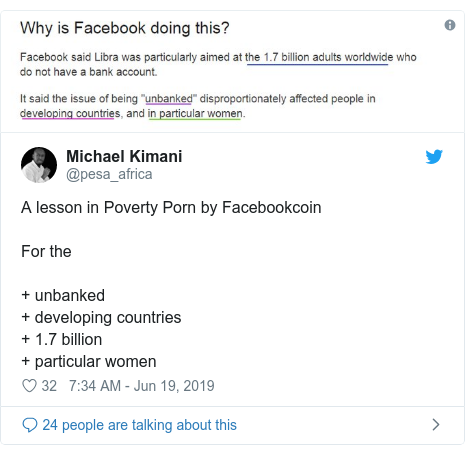 Image Copyright @pesa_africa@PESA_AFRICA
Report
Image Copyright @pesa_africa@PESA_AFRICA
Report
 With that all said, if on a future Sunday I could send my folks $100 to pay for some cattle vaccines via a WhatsApp message, and they could immediately go to their local agri-mart and make a purchase using Libra - that would be rather nifty.
With that all said, if on a future Sunday I could send my folks $100 to pay for some cattle vaccines via a WhatsApp message, and they could immediately go to their local agri-mart and make a purchase using Libra - that would be rather nifty.
I relish the prospect of a network like Libra permanently disrupting the lucrative cash remittance businesses of large banks and money transfer services" Andile Masuku Technology journalist
 As a Zimbabwean living in South Africa, I have become numb to the daylight robbery that ensues whenever I receive money from abroad or send cash to my family back home.
As such, like many other cautious pragmatists, I relish the prospect of a network like Libra permanently disrupting the lucrative cash remittance businesses of large banks and money transfer services like Western Union and MoneyGram.
According to a World Bank report published last year, the cost of sending cash in sub-Saharan Africa was at least 20% higher than any other region in the world. The report revealed that sending $200 to and from the region in the first quarter of 2018 cost a whopping $19.
But we must not be naive to the myriad factors responsible for maintaining market inefficiencies and actively engineering economic complexities which corporations like Western Union exploit to great effect.
As a Zimbabwean living in South Africa, I have become numb to the daylight robbery that ensues whenever I receive money from abroad or send cash to my family back home.
As such, like many other cautious pragmatists, I relish the prospect of a network like Libra permanently disrupting the lucrative cash remittance businesses of large banks and money transfer services like Western Union and MoneyGram.
According to a World Bank report published last year, the cost of sending cash in sub-Saharan Africa was at least 20% higher than any other region in the world. The report revealed that sending $200 to and from the region in the first quarter of 2018 cost a whopping $19.
But we must not be naive to the myriad factors responsible for maintaining market inefficiencies and actively engineering economic complexities which corporations like Western Union exploit to great effect.
 Image copyrightGETTY IMAGES
Image captionThe cost of sending cash in sub-Saharan Africa is 20% higher than any other region in the world
The fact is, many governments in Africa have enabled the remittance industry status quo and have come to rely on lining their coffers with remittance-related revenue.
Image copyrightGETTY IMAGES
Image captionThe cost of sending cash in sub-Saharan Africa is 20% higher than any other region in the world
The fact is, many governments in Africa have enabled the remittance industry status quo and have come to rely on lining their coffers with remittance-related revenue.
Security risks
African governments are also deeply suspicious of crypto-currencies, like Bitcoin. The long list of countries which have, in some way or another, prohibited the use of crypto-currencies includes Nigeria, Kenya, Ethiopia and even my native Zimbabwe, which is well on its way to being a cashless society thanks to the growing adoption of mobile money services. It abandoned its own currency for 10 years because of hyperinflation, and it is currently in the throes of trying to reassure a sceptical nation that the newly introduced Zimbabwean dollar has value. Policy makers in Zimbabwe have argued that the idealised notion of a crypto-currency does not adequately take into account some of the very real limitations and security risks. Think challenges in levying taxes, the risk of unwittingly enabling illicit activity and money-laundering, and of course the potential susceptibility to crypto-hackers.
Behind the jargon
- What is a crypto-currency?: It is has no notes or coins, exists online, and uses a technology called blockchain to underpin it. The most well-known one, Bitcoin, is not issued by governments or traditional banks
- What is blockchain? It is a method of recording data, a digital ledger of transactions distributed across computers around the world beyond the control of one person or entity
- What makes Libra different from Bitcoin? It will use blockchain technology but the digital ledger will be managed by a group of known companies
 And these are things that African leaders need to address with Facebook up front. In the US, lawmakers have already proposed a moratorium on the Libra rollout until Facebook assures Congress that Libra will not exacerbate money-laundering and the funding of terror groups among other issues.
Facebook's Libra white paper, which outlines the tech giant's plans to re-imagine global finance, does show that unlike completely decentralised digital currencies such as Bitcoin, which operate outside the oversight of central authorities or banks, Libra is set to be backed by a reserve of actual currencies and assets.
Facebook is using this difference to convince policy-makers that Libra is a bankable bet. It has the high-powered backing of the likes of Visa, MasterCard, Uber, Spotify and even South Africa's PayU.
And these are things that African leaders need to address with Facebook up front. In the US, lawmakers have already proposed a moratorium on the Libra rollout until Facebook assures Congress that Libra will not exacerbate money-laundering and the funding of terror groups among other issues.
Facebook's Libra white paper, which outlines the tech giant's plans to re-imagine global finance, does show that unlike completely decentralised digital currencies such as Bitcoin, which operate outside the oversight of central authorities or banks, Libra is set to be backed by a reserve of actual currencies and assets.
Facebook is using this difference to convince policy-makers that Libra is a bankable bet. It has the high-powered backing of the likes of Visa, MasterCard, Uber, Spotify and even South Africa's PayU.
'Free internet' backlash
As Facebook representatives push back against concerns regarding the extent of the company's self-interest in the Libra project, we would do well not to forget how it formerly served the world poverty-porn laden rhetoric to justify the global roll-out of Free Basics offering several years ago. Back then, the tech firm audaciously sold Free Basics, which lets people in some countries access Facebook and other websites without charge, as mankind's most significant development towards promoting "internet as a right" for all. Image copyrightAFP
Image captionIndia opposed Facebook having a monopoly over the internet with Free Basics
Dubbed by detractors as the "Internet According to Facebook", many African countries lapped it up.
India, quite famously, did not, arguing that it undermined the principle of net neutrality - the idea that all internet traffic should be treated equally - and that it was improper to allow Facebook to deliver a dumbed-down version of the internet to hundreds of millions of people.
Image copyrightAFP
Image captionIndia opposed Facebook having a monopoly over the internet with Free Basics
Dubbed by detractors as the "Internet According to Facebook", many African countries lapped it up.
India, quite famously, did not, arguing that it undermined the principle of net neutrality - the idea that all internet traffic should be treated equally - and that it was improper to allow Facebook to deliver a dumbed-down version of the internet to hundreds of millions of people.

You may also be interested in:
- 'I make my money from Bitcoin and tasty roast meat'
- Why African millennials can't get enough of Bitcoin
- How Facebook is being used to kill 'gangsters'
 With the help of the pan-African mobile telephone operator Airtel Africa, Facebook rolled out Free Basics in no less than 17 African countries.
It is hard to argue that offering poor, disconnected Africans limited web access to services like health, education, jobs, communication and local content at no cost to them is anything but beneficial.
Yet Facebook's now infamous business model of monetising user data makes it impossible to ignore the potential adverse long-term impact of allowing such a firm to profit from curating the only version of the internet millions of Africans may ever come to know.
Given the company's high-profile shortcomings, there is good reason to distrust Facebook and many die-hard crypto-currency proponents think of the Libra concept as the perfect prop for a hopelessly broken global finance industry.
With the help of the pan-African mobile telephone operator Airtel Africa, Facebook rolled out Free Basics in no less than 17 African countries.
It is hard to argue that offering poor, disconnected Africans limited web access to services like health, education, jobs, communication and local content at no cost to them is anything but beneficial.
Yet Facebook's now infamous business model of monetising user data makes it impossible to ignore the potential adverse long-term impact of allowing such a firm to profit from curating the only version of the internet millions of Africans may ever come to know.
Given the company's high-profile shortcomings, there is good reason to distrust Facebook and many die-hard crypto-currency proponents think of the Libra concept as the perfect prop for a hopelessly broken global finance industry.
 Image copyrightAFP
Image captionThe internet was cut off in Ethiopia recently first because of exams and then after an attempted coup
Critics also point to the ease with which African governments can cut off the internet and messaging apps, meaning if it suited them they could effectively cut off their citizens from accessing digital cash. Would it be wise for us to become too dependent on Libra?
The recent network issues on Facebook, WhatsApp and Instagram experienced in South Africa this past week have also served as a sober reminder of how economically disruptive relying on Facebook's Libra could prove to be should a similar outage occur again.
I am encouraged by how key personalities within Africa's innovative digital money community are leading impressively nuanced debate about the potential pros and pitfalls of Libra.
Social media posts and impassioned blog posts by Nigeria's Seyi Taylor, who thinks if it proves cheap and convenient, uptake could be rapid, and Kenya's Michael Kimani, who flags how it targets the poor, have so far prompted robust discussion online that one can only hope will filter into the hallowed halls of policy-making across the continent.
Image copyrightAFP
Image captionThe internet was cut off in Ethiopia recently first because of exams and then after an attempted coup
Critics also point to the ease with which African governments can cut off the internet and messaging apps, meaning if it suited them they could effectively cut off their citizens from accessing digital cash. Would it be wise for us to become too dependent on Libra?
The recent network issues on Facebook, WhatsApp and Instagram experienced in South Africa this past week have also served as a sober reminder of how economically disruptive relying on Facebook's Libra could prove to be should a similar outage occur again.
I am encouraged by how key personalities within Africa's innovative digital money community are leading impressively nuanced debate about the potential pros and pitfalls of Libra.
Social media posts and impassioned blog posts by Nigeria's Seyi Taylor, who thinks if it proves cheap and convenient, uptake could be rapid, and Kenya's Michael Kimani, who flags how it targets the poor, have so far prompted robust discussion online that one can only hope will filter into the hallowed halls of policy-making across the continent.
 With that all said, if on a future Sunday I could send my folks $100 to pay for some cattle vaccines via a WhatsApp message, and they could immediately go to their local agri-mart and make a purchase using Libra - that would be rather nifty.
With that all said, if on a future Sunday I could send my folks $100 to pay for some cattle vaccines via a WhatsApp message, and they could immediately go to their local agri-mart and make a purchase using Libra - that would be rather nifty.DISCLAIMER: The Views, Comments, Opinions, Contributions and Statements made by Readers and Contributors on this platform do not necessarily represent the views or policy of Multimedia Group Limited.
Tags:
DISCLAIMER: The Views, Comments, Opinions, Contributions and Statements made by Readers and Contributors on this platform do not necessarily represent the views or policy of Multimedia Group Limited.
Latest Stories
-
Eddie Nketiah scores twice in Crystal Palace win over Wolves
6 minutes -
The Pelican Hotel in Cantonments unveils a new era of hospitality
10 minutes -
Mpohor and Adum Banso in the Western Region welcome 20 Blue Water Guards
18 minutes -
Softcare celebrates Mother’s Day with donation to Korle-Bu Teaching Hospital
28 minutes -
Monetary Policy Committee of BoG begins meeting today; cedi performance high on the agenda
36 minutes -
itel debuts CITY series with CITY 100 new model: A stylish, durable & DeepSeek AI-powered smartphone for Gen Z
40 minutes -
Star Assurance, Hope for Little Lives deliver transformative outreach
49 minutes -
Tullow Ghana restarts drilling in Jubilee Field, signals renewed investment in energy sector
55 minutes -
Fidelity Bank Toastmasters Clubs shine at District 94 Conference in Côte d’Ivoire
59 minutes -
Empress Gifty sues Agradaa for defamation; demands GH₵20 million in damages
2 hours -
Elikplim Akurugu sworn in as member of NLA Governing Board
2 hours -
Government reclaims Asenayo Forest Reserve from illegal miners
3 hours -
NIB boss honoured as Peace Ambassador for commitment to unity and justice
3 hours -
Cedi appreciation to slash Ghana’s debt stock by 10% ahead of MPC meeting – JoyNews Research
3 hours -
‘The market women will lead the order’ – Accra Mayor’s new approach to reclaim choked business district
3 hours

